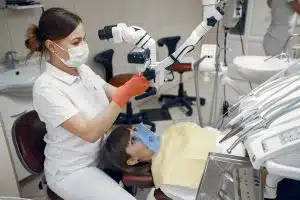Deciding on a healthcare career is no small task, and it’s one you’ll want to approach with plenty of thought. If you’re considering options like dental or medical school, you’ve probably wondered how hard dental school is compared to other paths in healthcare.
In this blog, we’ll be focusing on dental school. We’ll break down the challenges, the perks, and what to expect so you can figure out if this is the right fit for your goals. And, of course, we’ll tackle the big question: just how hard is dental school?
- What Is Dental School All About?
- How Much Is Dental School?
- Why Choose Dentistry?
- How to Become a Dentist
- Is Dental School for You?
- Dental School vs Medical School
- Frequently Asked Questions
- Takeaways
What Is Dental School All About?
Dental school is a specialized program designed to prepare you for a career as a dentist. It’s a dynamic and comprehensive discipline that covers everything you need to diagnose, prevent, and treat oral health issues. If you’re wondering how to become a dentist in the US, know that the curriculum includes subjects like:
- dental anatomy
- oral pathology
- periodontics
- endodontics
- prosthodontics
- orthodontics
Over four years, you’ll tackle rigorous coursework, hands-on clinical training, and plenty of practical experiences. You’ll learn how to perform key dental procedures like fillings, root canals, extractions, and even dental implants. On top of that, you’ll become a pro at educating patients on oral hygiene and the importance of regular dental check-ups.
Once you complete dental school, you’ll earn either a Doctor of Dental Surgery (DDS) or Doctor of Dental Medicine (DMD) degree, depending on your institution.
Beyond mastering the biological and dental sciences during the first two years, you’ll spend the last two years honing your clinical skills. Afterward, you’ll need to pass a state licensure exam—both written and clinical—to start practicing as a general dentist. And if you want to specialize, there’s even more training and certification ahead, including board exams and optional residencies.
How Much Is Dental School?
Devoting yourself to years of intensive dental education is no small feat. It comes with a hefty price tag, too. Here are some relevant information on the costs of dental school in the US:
Application and admission tests
The primary application fee for dental school starts at $251, with an additional $108 per school after the first. Then, each dental school typically charges a supplemental fee of $50 to $90. Don’t forget the DAT, which adds another $475 to the bill.
If you apply to just 10 dental schools, your total comes out to around $2,500. That’s about the same as applying to medical schools—but with fewer applications in the mix. It’s a costly process, and you might catch yourself asking not just how hard dental school is to get into, but how much it’s going to cost you!
Average tuition cost and fees
If you’re a resident at a public medical school, you’ll pay about $37,000 annually, and private schools bump that up to $62,000. For non-residents, the costs climb to around $60,000 no matter the type of school.
Dental school is even pricier. If you’re a resident, you’re looking at an average of $53,000 per year at public schools and a staggering $72,000 at private ones. And for non-residents? Expect to pay around $69,000 annually.
The debt adds up, too. For dental school grads, that number jumps to $292,000. So if you’re asking yourself not only how hard dental school is but how much it’s going to cost, the numbers paint a pretty clear picture: dental school comes with a higher price tag.
Financial aid and scholarship opportunities
Schools like UC San Francisco School of Dentistry and Penn Dental Medicine are known for their generous support. That said, you’ll want to weigh your options carefully, especially since dental school can be quite costly. But with some planning and research, you can find ways to lighten the load.
Why Choose Dentistry?
The ratio of practicing dentists to the population varies significantly, ranging from about 42 to 108 dentists per 100,000 people, according to the American Dental Association. So, considering a career in dentistry? Here are just a few reasons why you should pursue it:
1. Restore the oral health and transform the lives of patients
Whether providing preventive care, performing restorative procedures, alleviating pain, or enhancing dentofacial aesthetics, a dentist often has the privilege of making a real, positive difference in a patient’s life—even within a single visit. The satisfaction and joy of restoring oral health and boosting a patient’s confidence is a rewarding aspect of the profession.
2. Earn a good salary
In terms of growth and earnings, dentists are in demand, with projected employment growth around 5% as reported by the Bureau of Labor Statistics. According to the 2023 ADA Health Policy Institute Survey of Dental Practice, the average annual net income for general practitioners who own all or part of their practice is $218,220, while dental specialists earn an average of $335,920. Income levels vary across the country and depend on the type of practice.
3. Being precise and accurate
Compared to the uncertainties often encountered in medicine, dentistry offers a level of precision that many find appealing. The work can be mechanical and repetitive, which some may find comforting. In most cases, you can provide patients with clear prognoses, supported by precise tools that allow you to perform your work with accuracy.
How to Become a Dentist
Becoming a dentist in the U.S. is a journey that’s both rewarding and structured. The first step is earning your bachelor’s degree. While you can major in anything, focusing on science courses like biology, chemistry, and physics will help you meet dental school prerequisites. Many pre-dental students choose science majors to stay on track.
Once you’ve got your degree, it’s time to tackle the Dental Admission Test (DAT). This exam tests your academic skills and scientific knowledge, so aim for a strong score—it’s a big factor in getting into dental school.
Next up is dental school itself. You’ll spend four years studying and training to become a dentist. The first two years are all about classroom and lab work, while the last two are hands-on clinical practice where you’ll treat patients under supervision. By the time you graduate, you’ll earn your DDS (Doctor of Dental Surgery) or DMD (Doctor of Dental Medicine) degree—both mean the same thing.
Before you can officially practice, you’ll need to pass the Integrated National Board Dental Examination (INBDE). This test ensures you’re ready for professional practice. Then, you’ll need to get licensed in the state where you plan to work. This usually involves passing a regional clinical board exam and meeting any specific state requirements.
If you’re thinking about specializing—maybe in orthodontics or oral surgery—you’ll need to complete a residency program, which can take an additional 2–6 years, depending on your focus. After that, you’ll take another board exam to become certified in your specialty.
Once you’ve got your license, you’re ready to start practicing! You can work in private practice, join a group, or explore public health opportunities. And even after you’ve settled into your career, you’ll keep learning by completing continuing education credits to stay updated on the latest advancements in dentistry.
Is Dental School for You?
Now that we’ve looked at the program, career prospects, and lifestyle aspects of the dental profession, how do you figure out which path is right for you?
1. Know your personal interests and skills.
Take a moment to think about what excites you most. Are you drawn to the intricate details of oral health? Are you interested in restoring the smile and confidence of others? Your interests and natural strengths play a huge role in determining the best fit for you. And if you’ve been wondering how hard dental school is, this is the perfect time to think about whether the challenges align with your passion for dentistry.
2. Weigh the pros and cons.
It’s important to weigh the pros and cons of each profession. Consider things like program length, tuition costs, earning potential, career opportunities, work hours, and how each aligns with the work-life balance you want. Taking a step back and looking at all these factors can help you see which path feels more in sync with your goals.
3. Seek guidance and mentorship.
Don’t hesitate to reach out to practicing dentists for their advice. They’ve been through the journey and can share insights you won’t find online. Shadowing professionals in both fields is also a great way to experience the day-to-day realities firsthand. It can even give you a better sense of how hard dental school is in comparison to medical school or vice versa.
Dental School vs Medical School
But how hard is dental school compared to other paths, especially medical school? Let’s take a moment to understand what each path involves.
Both dental school and medical school are prestigious programs designed to train dedicated individuals like you who aspire to make a difference in healthcare. While they share a strong emphasis on delivering excellent patient care, each has its own unique focus and scope, so understanding these differences can help you decide which journey aligns with your goals.
Medical school is an intense and demanding program that prepares you to become a physician capable of diagnosing and treating a wide range of illnesses. If you’ve ever wondered how hard dental school is compared to medical school, medical school dives deep into the complexities of the human body, diseases, and medical interventions.
The curriculum starts with a solid foundation in basic sciences like anatomy, physiology, biochemistry, and pharmacology. From there, you’ll explore clinical sciences, including specialties like:
- internal medicine
- surgery
- pediatrics
- psychiatry
Throughout the program, the emphasis is on critical thinking, problem-solving, and evidence-based medicine—skills you’ll refine through lectures, lab work, and hands-on clinical rotations.
You’ll learn how to diagnose illnesses, interpret tests, develop treatment plans, and provide care to patients. And while dental students follow a structured curriculum, medical students often customize their fourth year with electives aligned to their chosen specialty—adding a layer of personalization to their training.
Medical school typically includes additional steps like the United States Medical Licensing Examination (USMLE) and a residency, which can last 3 to 7 years depending on the specialty.
Frequently Asked Questions
1. How many years does it take to become a dentist in the US?
A traditional dental dentistry program in the US lasts four years.
2. What are the pros and cons of being a dentist?
Dentistry offers great earning potential, with an average salary of around $156,000—and even more for specialists. The job comes with a solid work-life balance, especially if you run your own practice and set your schedule. Plus, dentists are in demand, and many find their work fulfilling since they help improve patients’ health and confidence.
On the flip side, dental school is expensive, and most graduates come out with significant debt (around $292,000 on average). The job can be physically demanding, leading to strain on your back, neck, or hands. Running a practice also comes with high costs for equipment and staff, and the routine nature of dental procedures might not appeal to everyone.
3. How many dental schools are in the US?
According to the American Dental Association, there are 75 accredited dental schools in the US.
Takeaways
- If you’re passionate about oral health and comfortable with the challenges, being a dentist can be a rewarding and stable career.
- The choice between dental school and medical school is deeply personal. By reflecting on your goals, seeking guidance, and doing your research, you’ll be well-prepared to make a decision that sets you up for a rewarding healthcare career.
- Excited to apply to your dream dental or medical school? We got you. At AdmissionSight, we have more than a decade of expertise in helping students like you create a compelling college application for the best universities in the US.









































